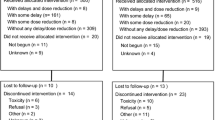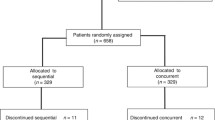Abstract
Purpose: To compare the efficacy and toxicity of epirubicin to that of the combination of epirubicin and cisplatin in patients with advanced breast cancer. Patients and methods: A total of 155 patients were randomized to receive either epirubicin (70 mg/m2) days 1 and 8 every 4 weeks or epirubicin (60 mg/m2) days 1 and 8 plus cisplatin (100 mg/m2) day 1 every 4 weeks. Epirubicin was continued until disease progression or to a cumulative dose of 1000 mg/m2. Cisplatin was discontinued after six cycles. In 45 premenopausal women an oophorectomy was performed. None of the evaluable patients had received chemotherapy for metastatic disease. Results: Among evaluable patients (74 in the epirubicin group and 65 in the epirubicin plus cisplatin group) there were 19% vs 29% complete responses, and 42% vs 37% partial responses, with no significant difference. In the epirubicin plus cisplatin group the response rate was significantly higher in previously untreated patients as compared with patients who had received adjuvant chemotherapy (74% vs 55%, P=0.002). Median times to disease progression were 8.4 months in the epirubicin group and 15.3 months in the epirubicin plus cisplatin group (P=0.045). Median survival times were 15.1 and 21.5 months, respectively (P=0.41). In the epirubicin plus cisplatin group leukopenia and thrombocytopenia were significantly more frequent, 29% of the patients developed mild to moderate peripheral neurotoxicity, 34% reported tinnitus and hearing changes, 6 patients developed nephrotoxicity (one died due to nephrotic syndrome), and 3 patients developed leukaemia (two died of this cause). Congestive heart failure occurred in six patients in the epirubicin group and three patients in the epirubicin plus cisplatin group. Conclusion: Cisplatin plus epirubicin is an active, although highly toxic regimen when used as first-line therapy in advanced breast cancer. The time to disease progression was significantly longer in the cisplatin plus epirubicin group (increased by 82%). Due to toxicity, the combination regimen cannot be recommended. However, the study indicated a very high activity of cisplatin in advanced breast cancer. Studies of first-line therapy in advanced breast cancer including cisplatin or other platin derivatives in combination with, for example, the taxanes are suggested.
Similar content being viewed by others
Author information
Authors and Affiliations
Additional information
Received: 8 December 1999 / Accepted: 17 July 2000
Rights and permissions
About this article
Cite this article
Nielsen, D., Dombernowsky, P., Larsen, S. et al. Epirubicin or epirubicin and cisplatin as first-line therapy in advanced breast cancer. A phase III study. Cancer Chemother Pharmacol 46, 459–466 (2000). https://doi.org/10.1007/s002800000178
Issue Date:
DOI: https://doi.org/10.1007/s002800000178




